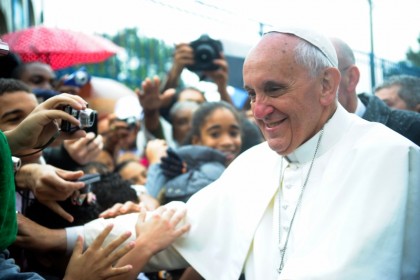The Post-Francis Effect
Devra Torres | Sep 29, 2015 | 3 cmts

The Pope is back on the other side of the ocean. The crowd-control fences are gone, the altar dismantled, the traffic patterns back to what passes for normal here in the District of Columbia. The legions of TSA agents are off on some less spectacular assignment.
Even the moon is back to normal.
It’s not that I feel cheated. My husband snagged me a ticket for the Papal Mass, and the clouds cleared away just in time for us to get a good, hard look at the supermoon. (We even found the binoculars before the spectacle was over, a once-in-a-lifetime portent in itself.)
But now what?
In the aftermath of all the excitement, one question seems obvious: how to hang onto all your good intentions when the euphoria is over? You were touched, or moved, or shaken out of your customary inertia? Fine. And so what? For how long? After all, emotional highs aren't guaranteed to translate into a better character, improved habits. And if no transformation ensues, wasn't it all just an illusion? You're back where you started, but a little more disenchanted, a little more cynical.
The obvious moral of the story seems to be: Distrust the heart. Stick to the solid ground of intellect and will.
But wait a minute.
Not so fast.
The simplistic assumption is everywhere: as if, on the one hand, you have random, irrational sentiment, floating in the void, and sub-rational animal instincts. On the other, intellect and will: that by which we connect with reality and get things done.
Dietrich von Hildebrand wrote an entire (though short and accessible) book called The Heart about this caricature of affectivity, and he says it better than I do. But affectivity is not given to the human person just to be warily ignored or incessantly overruled. Nor are all affective responses created equal.

Some are physiologically driven and can be traced back to a stray hormone (or some other equivalent of the "undigested bit of beef" which Scrooge blames for the apparition of Marley's Ghost). Others are fleeting sentimental reactions too feeble to affect your action, or even your sentiments, ten minutes after they're felt. But others are responses of the heart--the center of the person--and shouldn't be dismissed so carelessly.
It seems obvious--but only at first glance--that the affections are uniquely untrustworthy, because, after all, they can be so misleading. How many people have pleaded "love" as an excuse for adultery; how often has manipulating the helpless, or even destroying them, masqueraded as "compassion"?
But is the intellect any more reliable, when it's out of sync with the heart and the will? Intellectuals have committed more than their share of insidious crimes. And the will, in isolation, can be monstrous.
I don't mean to make the human person sound like one of my son's Lego figures, composed of three kinds of parts, with the trick being to get the proportions just right. Bur a realistic view doesn't reduce the heart (or the intellect or the will, for that matter) to a caricature of itself..jpg)
So I can understand if some are unmoved (as the always-worth-reading Max Lindemann describes in "Immune to the Francis Effect"), or suspicious when they see the Vicar of Christ being treated like Taylor Swift. (As Michael Gearson notes, they're the only two for whom the NFL schedule has ever been adjusted). I can understand skepticism at the notion that emotional overload can save the world.
But the danger, post-Francis, is not so much that people will count on an emotional high to deliver more than it can. If this past week took you out of yourself, and made the impossible seem plausible, the question is not whether your affections were touched by his gestures, or your reason inspired by his words, or your will boosted by his example.
It's whether you'll continue to generate a chain of free, personal responses to the reality you've bumped up against.


Comments (3)
Katie van Schaijik
Sep 30, 2015 11:48am
Not long ago, a highly educated and spiritually astute priest friend said to us, "Forget Reason. It's gone. Now we have to address ourselves to feelings."
Of course that's too baldly put, but it strikes me as deeply true, and its truth is reflected in the difference in personal charism and emphases in Francis vis. a vis. his two great predecessors.
We conservatives have a tendency to focus too much on rational argumentation and objectivity, when what is really wanted today, the Pope seems to be telling us, is attention to subjectivity, and especially to wounds.
Devra Torres
Sep 30, 2015 9:12pm
Yes! It reminds me of a post by Leilia Miller of Little Catholic Bubble, called "When Truth doesn't cut it." It was posted a little after Pope Francis was elected. She says:
Devra Torres
Sep 30, 2015 9:16pm
I can relate to this--when my family came into the Church, my parents read their way into the Church, and we were "Wanderer Catholics." There were plenty of people soft-peddling Truth in the late 70s, but they were all relativists, or at least deeply confused.
So by necessity (because of all the deficient catechesis over the last few generations), but also because people like us were really missing something about the subjective dimension of the whole thing, Pope Francis' approach makes a lot of sense.